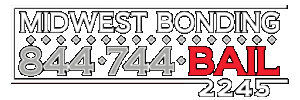Common Questions & Answers
Midwest Bonding Bail Bonds put together this bail bonds FAQ to help you get a better understanding of how the bail process works in Minnesota. If you or your loved one is in custody, a bail bond is the document that is presented to the court to secure the release of a defendant and ensure their appearance at all required court hearings.
Usually after the arrest of a defendant, a bail amount is set by the local court jurisdiction. At that time, a loved one (also known as a indemnitor or co-signer) makes arrangements with an agent to post the bail bond.
Paperwork is completed guaranteeing the appearance of the defendant in court, and a percentage of the bail amount is paid up front. You, as the indemnitor, guarantees that you will pay the full amount of the bond if the defendant fails to appear in court.
Some form of collateral may be required to secure the guarantee of the bail bond and that the person you signed for will appear in court. This can be anything of value such as cash, property, art or jewelry. All collateral is returned once the case against the defendant is completed.
A judge sets the defendant’s bail amount considering the following:
- Nature and seriousness of the charges
- The weight of the evidence
- Defendant’s character and history
- Is the defendant a flight risk
- Depending on county, judges may use a bail schedule based on specific crime alleged to have been committed.
Only 10% of your full bail is required for release. You’re facing troubling times right now, so we’ll post the bail bond for you! Typically, a premium charge of 10% of the full bail amount is all that is required.
- Cash
- Credit Card (Visa & Mastercard)
- Online payment via our secure servers
- Physical Collateral
- The signing of a bail bond agreement (contract)
- Signature of a responsible indemnity or cosigner that will pay the full amount of the bail in the event that the defendant fails to appear in court
Paperwork through a bail agent usually takes less than an hour to complete. Release times however, vary from county jail to county jail and could take anywhere between 30 minutes and 12 hours. Please note that you may have to wait for the defendant to be booked into the jail prior to issuing the bond.
If a defendant fails to appear in court, the court issues a bench warrant for that person’s arrest and they are considered a fugitive. We then hire a Fugitive Recovery Agent to locate and apprehend the defendant.
While being released on your own recognizance seems like the best value for your money at the time, things like alcohol monitors and drug patches/testing may actually end up costing you more in the long run. Most criminal cases do not resolve quickly, and you are left paying initial set up fees and monthly or biweekly fees for these services. By posting a bond, you pay only 10% of your full bail!

